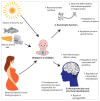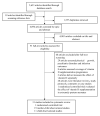Effects of vitamin D deficiency on neurobehavioural outcomes in children: a systematic review
- PMID: 32399499
- PMCID: PMC7194460
- DOI: 10.12688/wellcomeopenres.15730.2
Effects of vitamin D deficiency on neurobehavioural outcomes in children: a systematic review
Abstract
Introduction: Vitamin D plays an important role in brain development in experimental studies; however, the effect of vitamin D deficiency on child development remains inadequately characterized. We aimed to estimate the effects of vitamin D deficiency on neurobehavioural outcomes in children up to 18 years of age. Methods: We searched PubMed, EMBASE, PsycINFO, Scopus, Cochrane Library, Web of Science and Open Grey for published studies up to 10th January 2020. We included all studies that assessed the effects of maternal or child vitamin D status or vitamin D supplementation on neurobehavioural outcomes in children. Study findings were synthesized qualitatively as the high level of heterogeneity in study populations and methodologies precluded a quantitative meta-analysis. Results: Our search identified 5,633 studies, of which 31 studies with 31,375 participants from 18 countries were included in the systematic review. Of the studies identified, one was a randomised controlled trial (RCT) of vitamin D supplementation in children, while 30 were observational. The RCT (n=55) reported a beneficial effect of supplementation with lower doses compared to higher doses of vitamin D on motor development. Twelve mother-child studies (n=17,136) and five studies in children (n=1,091) reported an association between low maternal or child 25-hydroxyvitamin D levels and impaired neurobehavioural outcomes in children, while 15 mother-child studies (n=20,778) and eight studies in children (n=7,496) reported no association. Conclusions: Although animal studies point to an effect of vitamin D deficiency on brain development, there are few studies on the effects of vitamin D deficiency on neurobehavioural outcomes in children and their findings are inconsistent. There is a need for well-conducted, adequately powered studies to further determine these effects in children. Registration: PROSPERO ID CRD42018087619; registered on 15 February 2018.
Keywords: Vitamin D deficiency; brain development; children; cognitive; development; language; motor; neurobehavioural outcomes.
Copyright: © 2020 Mutua AM et al.
Conflict of interest statement
No competing interests were disclosed.
Figures
References
-
- Global Research on Developmental Disabilities Collaborators: Developmental disabilities among children younger than 5 years in 195 countries and territories, 1990–2016: a systematic analysis for the Global Burden of Disease Study 2016. Lancet Glob Health. 2018;6(10):e1100–e1121. 10.1016/S2214-109X(18)30309-7 - DOI - PMC - PubMed
Publication types
Associated data
Grants and funding
LinkOut - more resources
Full Text Sources




